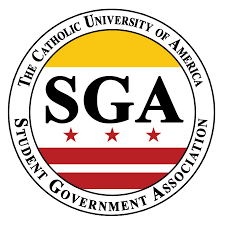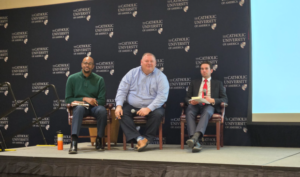SGA Reforms Bylaws, Passes Legislation on Minority Scholarships, Sparking Debate Among Senators

Image Courtesy of The Catholic University of America
By Anna Harvey
The Catholic University of America Student Government Association hosted its final meeting of the 2020-21 academic year on Monday, April 26. SGA Vice President Gemma del Carmen presided and senators participated via Zoom.
Session 6-13 covered several bills, one piece of legislation, and various bylaw reforms. The session began with public comments.
Treasurer-elect Curtis Bommer and Treasury Board Director Rebecca Loveless commented on the Executive Budget and bylaw reform, and supported the new Treasury Board members for the 2021-22 academic year. President Gerald Sharpe congratulated members of the Senate for their service over the academic year. President-elect Abby Anger and Vice President-elect Monica Wallace both stated their excitement for the coming academic year.
The proceedings then moved to approval of the Executive bylaws. Topics addressed included the function of the Board of Elections and the procedure for write-in candidates, whereby the write-in candidate would submit their preferred name to the Board of Elections and the Board would determine if a misspelling of a write-in candidate’s name is considered a viable vote or indiscernible from a write-in candidate’s full name. In addition, the bylaws would require spending limits on campaigns and candidates could not receive and publicize endorsements from other student-led organizations. Candidates also cannot receive donations from third-party organizations and University student organizations, excluding donations from individuals.
President Sharpe then spoke on the specifics of these new executive bylaws, which had not been revised since 2016. Campaign revisions would prevent student organizations from having a foot in the door while presenting before the Treasury, as well as prevent political organizations from choosing a side in a public election, and help to clarify vote allocation.
Senator Allison Sijgers supported the amendment of the bylaws, although she disagreed with the cap of $1,250 and believed that it should be further lowered. Senator Garrett Farrell asked Sharpe to clarify the Board of Elections’ role in analyzing campaign spending over the past year. Sharpe responded that this task was delegated to a virtual member who analyzed receipts and kept track of spending.
The executive bylaw revisions passed with 24 yeas, 0 nays, 0 abstensions, and 2 not present.
The proceedings then passed to the Executive-elect budget approval of $29,930. Del Carmen stated the costs of various events, materials, and projects over the past year for comparison.
Anger stated that the new executive would be aiming for one of the lowest budgets in SGA history. Outreach events included an event at the beginning of the academic year to introduce students to their new senators and a Commuter and Transfer Student Executive initiative. She stated that there would be three projects that would take funds from the underused SGA Express program from prior years: Menstrual Equity, Our Voices, and an Uber and RideShare project.
With 23 yeas, 0 nays, 0 abstentions, and 3 not present, the Executive-elect Budget passed.
The proceedings then passed to approving Treasury-elect directors, all of whom passed the Senate with 23 yeas.
The proceedings then passed to Bill 006, a bill to clarify procedures for when a piece of legislation is withheld from the Senate agenda, sponsored by Sijgers and cosponsored by Senators Birth, Bracey, Lucardi, Marsden, Schlee, Schmidt, and Zentz. This legislation would require an explanation from the Executive in an official email to senators when a piece of legislation is withheld prior to a Senate meeting, excluding pieces scrapped during the drafting portion in committee or submitted less than 48 hours in advance. It would also permit senators to bring the withheld legislation to the floor in order for other senators to determine its legitimacy. Sijgers explained that this would ensure that if a president announces that they would withhold a piece of legislation for specific reasons, they would be protected from accusations of bias.
A 45-minute debate ensued, with concerns from Senators Harrison and Besendorfer focusing on potential abuse of this legislation and the potential for future interjections of withheld legislation to lead to confusion within Senate meetings.
Del Carmen reminded the Senate to maintain decorum, stating that it had been an issue this year.
The Bill failed, not having met the two-thirds majority, with 13 yeas, 8 nays, 2 abstentions, and 3 not present.
The proceedings then shifted to Bill 007, a bill to cap Senate election money and restrict endorsements, sponsored by Zentz and cosponsored by Birth, Bracey, and Sijgers. Building upon the aforementioned Executive bylaws, Zentz clarified the $300 cap for campaign materials.
The resolution passed 22 yeas, 0 nays, 0 abstentions, and 4 not present.
The proceedings then passed to Resolution 032, to increase scholarship opportunities for minority students, sponsored by Lucardi and cosponsored by Senators Brown, Sijgers, and Schlee. Lucardi explained that scholarship opportunities could allow minority students more avenues to come to Catholic University and diversify the campus community. Lucardi stated that the resolution did not require the University to use money when funds are sparse.
Senator Scott called the resolution “inherently racist,” stating that the resolution was targeted directly at minority students and gave them advantages over white students. Del Carmen corrected Scott on the accurate use of the term “racism.”
“I want to make sure that the language that we’re using is accurate, and that we’re maintaining respect in regards to this resolution,” del Carmen said. “As a student of color, this is something that’s really important to me, and as someone who has experienced racism on this campus, I want to make sure that we’re using that word in defining it appropriately.”
Lucardi additionally stated that there already existed a similar scholarship at the University, and that any additional scholarships would pass by the legal department in the University.
“We know through a lot of research that minority students come from economically-disadvantageous backgrounds, so I disagree that the University would have to review Title VII of the 1964 Civil Rights Act,” Lucardi said.
Senator Ahearn added that scholarships are not dispensing money to someone solely based on the color of their skin but rather would address the disparities in economic status among most minority households, attempting to promote equity for all applicants.
Lucardi clarified that “minority” has been used broadly and should not be targeted at a specific race, as well as that the current minority scholarship is available only for juniors and seniors. Sijgers added that due to systemic racism, minority students experience hurdles all during their journey through primary, secondary, and higher education and would need extra financial assistance to attend an expensive institution such as CUA.
After extensive debate, the Resolutions passed with 21 yeas, 2 nays, 0 abstentions, and 3 not present.
The proceedings shifted to the final piece of legislation, Resolution 033 sponsored by Senator Holcomb and cosponsored by Bracey, Marsden, and Sijgers. The resolution would increase the amount of outdoor furniture around campus in order to keep with CDC health guidelines with more students returning to the University in the fall.
The Resolution passed with 24 yeas, 0 nays, 0 abstentions, and 2 not present.
Del Carmen clarified that with respect to Resolution 022, the University would not be able to extend the on-campus Starbucks hours due to budgetary constraints.
The proceedings finished with the senior senators’ brief statements on their time in the Senate.






